Marsabit County has witnessed sporadic incidents of conflict between communities over the past decades. The cycles of violence in the county have intensified since 2005, with tensions escalating to an all-time high in 2021 and early 2022. Due to this intensification of violence, the National Cohesion and Integration Commission (NCIC) and Interpeace began implementing a joint peacebuilding initiative to end violence in the county earlier this year. The ‘Marsabit County Peacebuilding Programme-Stabilization Phase’ was officially launched on 14 November, together with an event to mark the opening of the NCIC satellite office in Marsabit town.
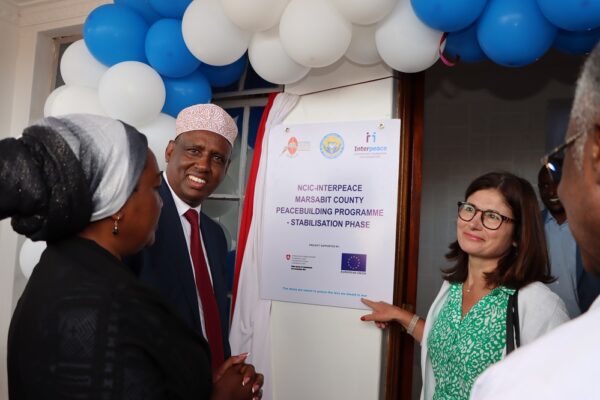
During the 2022 elections in Kenya, the programme, supported by the European Union (EU) and the Swiss Agency for Development and Cooperation (SDC), focused on preventing an escalation of violence. Since then, the security situation has improved significantly, after Gabra and Borana communities started getting together by their own initiative, agreeing to co-exist peacefully. This has resulted in a gradual resumption of normalcy, with roads starting to reopen and stolen livestock being returned. The programme is now turning its efforts towards supporting these initiatives, while putting in place preconditions for peace by developing and strengthening structures for sustainable and inclusive conflict management.
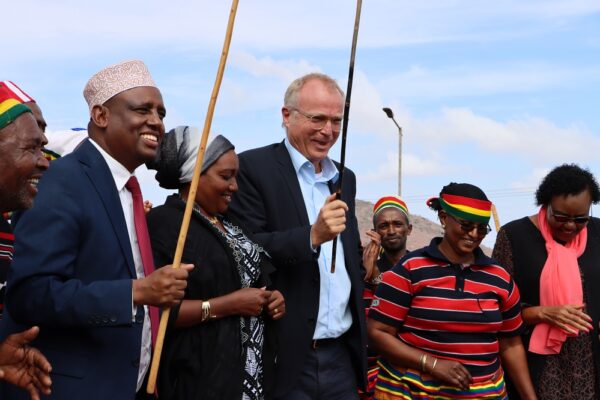
Speaking in Marsabit during the opening of the new office, NCIC Chairman Rev. Dr. Samuel Kobia said “Marsabit County had lost over 400 people to intercommunal violence in the last five years, with the Saku constituency being the most affected. The conflict resulted in the loss of lives, destruction of property, disruption of service delivery, and disruption of development activities and socio-economic activities”.
Kobia said it was encouraging to note that normalcy was slowly returning to the region due to the efforts of the political leaders, religious leaders, peace actors, and security teams that have worked tirelessly to maintain peace.
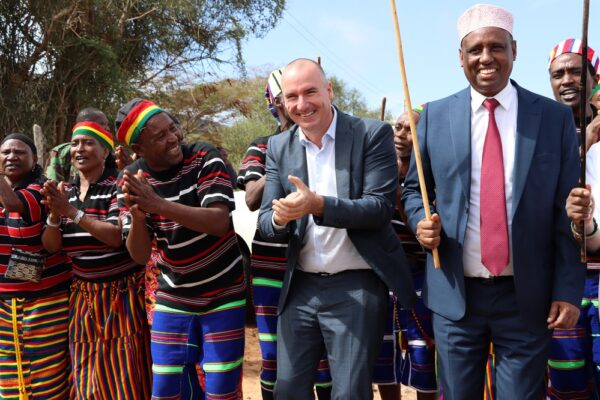
Dr Theo Hollander, Interpeace’s Senior Regional Representative for the Horn of Africa, said that he was pleased to see that incidents of violence had started to decline, particularly emphasizing the emergence of grassroots peace initiatives.
"In the one and a half years after we did our rapid conflict assessment, we can see that security actors have stepped up and launched a security action that has opened a window of opportunity for the emergence of community-driven peace processes. Most importantly, we have seen significant efforts from the affected communities to bend the spear and try to reconcile. Interpeace is here to support these efforts," he noted.
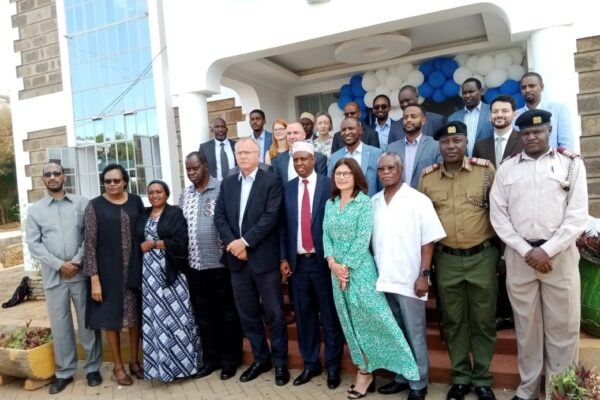
To better understand the nuances of the conflicts, in May 2021, NCIC, Interpeace, the County Government of Marsabit, and the National Steering Committee on Peacebuilding and Conflict Management undertook a joint conflict assessment to identify main drivers of conflict and sources of resilience in Marsabit County. The results identified ethno-politicisation, a zero-sum approach to power and resources, unresolved individual and collective grievances, impunity, and government inaction as key factors fueling violent conflict. The ‘NCIC-Interpeace Marsabit County Peacebuilding Programme- Stabilization Phase’ seeks to reduce violence, before and after the 2022 elections, by mobilising actors across society, while gaining a consensus for long-term peacebuilding and conflict resolution needs and priorities.
Through this initiative, trust has been restored between communities and the culture of peace and reconciliation nurtured – hence addressing some structural issues that often trigger conflict with the lead of communities.
In the Democratic Republic of Congo (DRC), women and youth are the most affected by conflict, yet they are often under-represented in peacebuilding and social cohesion efforts. There is a need for them to be targeted as peace actors in the current mediation process, which is why an Ituri Mediation Advisory Group was established, with the aim of being inclusive and ensuring good representation of women and youth.
Formation of an advisory group is part of a vision of ownership and sustainability of peace efforts by local communities and of strengthening their capacity for conflict resolution. As part of this process, stakeholders were consulted and the results of this approach were validated by provincial actors from public institutions and civil society, including women and youth associations.
Among its recent activities, the group organised a workshop on 29 September, a few days after the International Day of Peace, to relay mediation and negotiation skills to women and youth. Participants were asked "What can be done for the return of peace in Ituri?” In collaboration with the Ituri provincial government, and with the support of the European Union, this meeting took place in Bunia and was facilitated by the mediation consortium composed of Interpeace and its Action for Peace and Concord (APC) partners, and the Congo Research Group (CRG) of New York University (NYU).
According to most of the participants, the workshop was beneficial in contributing to strengthening the involvement of youth and women in the existing peace mechanisms in their province. "Ever since the word 'communitarianism' was first used in Ituri, each community has used this word to arm itself to face the opposing community. But this word has already destroyed Ituri. The community should therefore not be a place of identity withdrawal against others but a space for dialogue to live together," expressed a member of the Ituri Women's Collective.
This opinion was also shared by the representatives of the public authorities. "This kind of meeting is a good opportunity to raise awareness of the culture of living together," says Esther Maturu, Deputy Coordinator in Ituri of the Disarmament, Demobilisation, Community Rehabilitation and Stabilisation Programme (P-DDRCS/Ituri).
The advisor to the provincial military governor in charge of youth, Irène Vaweka, reminded the assembly that "for some time now, young people have increasingly become executioners and that women are the main victims. By bringing all these people together around the issue of peace, this workshop presents a golden opportunity for the young people present to show the world that they too can commit themselves to peace.”
Facilitation of the workshop was an important step in the work of the Ituri Mediation Advisory Group towards creating inclusivity spaces for women and youth. The group will continue its efforts to ensure that women and youth have an opportunity to build their conflict transformation skills in their communities.
Women correction officers constitute one quarter of the workforce of the Rwanda Correctional Service (RCS). Alongside their male counterparts, they play a pivotal role in rehabilitating and reintegrating prisoners in the community. However, many challenges still hinder their professional performance and career growth.
On 20 September 2022, the RCS organised the 3rd Rwanda Correctional Service Women Convention, in partnership with Interpeace and RCS’s local partner, the Dignity in Detention Organization (DIDE). The Convention aims to promote gender equality and accountability in the correctional sector.
The two-day event was timely because it occurred a few months after validation of the Curriculum for Prisoner Rehabilitation and Reintegration on 20 July 2022. The Curriculum was jointly developed by Interpeace and RCS, with the technical assistance of the Institute for Legal Practice and Development (ILPD). To implement the curriculum effectively and successfully will require the efforts of all RCS staff members and other stakeholders.
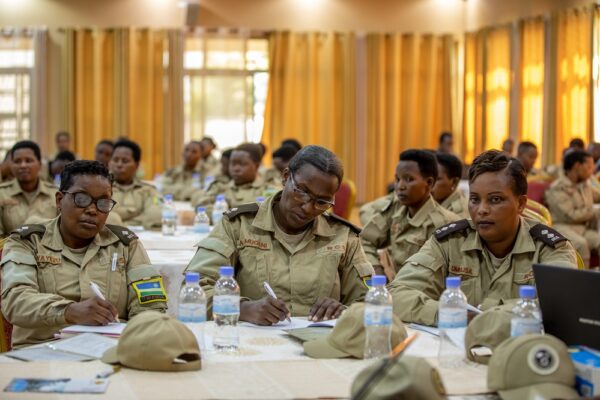
Speaking at the event, the Commissioner General of RCS, CGP Juvenal Marizamunda, explained that the convention’s first purpose was to enhance women’s empowerment in the RCS, in order to improve the performance of female correction officers as well as identify and address any challenges that they face while carrying out their duties.
Titled “Empowering female correction officers towards a professional career: a shared responsibility”, the conference enabled the participants to share professional experiences, information and good practices, and identify the needs and concerns of RCS female correctional officers as well as issues that impede their performance.
The Conference’s approach aligned with Interpeace’s Societal Trauma Healing Programme in Rwanda, funded by the European Union and the Government of Sweden through SIDA (Swedish International Development Agency).
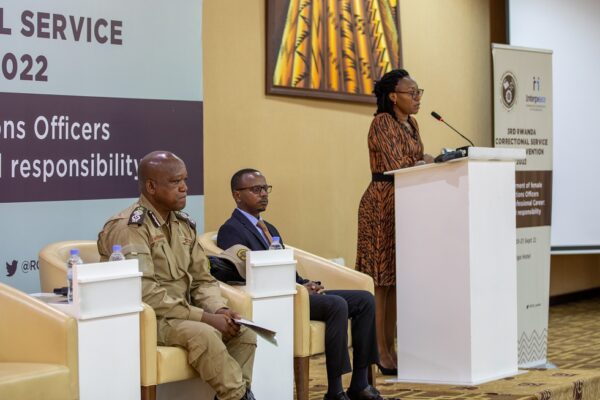
The Societal Trauma Healing Programme includes a component that supports national efforts to rehabilitate and reintegrate prisoners, focusing particularly on those convicted for crimes related to the 1994 Genocide against the Tutsi. The rehabilitation component is led by DIDE and Prison Fellowship Rwanda, Interpeace’s local partners, which have set up healing spaces in prisons and strengthened the capacity of RCS staff members, including through psychoeducation.
Two of the main challenges that participants identified were the low representation of women in leadership positions in RCS units, and the limited access of women to learning opportunities.
The Curriculum aims to equip inmates and RCS staff with more knowledge in a range of areas, including human rights, legal awareness, family dynamics, the safe return of inmates, and positive connections with the community. It will help inmates and RCS staff to tackle some of the challenges that Conference participants identified, especially the need to strengthen capacity through training.
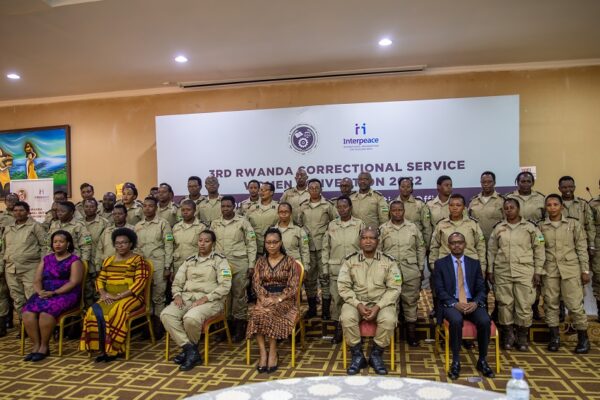
We are honoured to welcome two ambassadors to our Advisory Council: H.E. Eamonn Mac Aodha, Charges d’affairs ad interim of the Permanent Mission of Ireland to the United Nations in Geneva; and H.E. Lars Tummers, Deputy Permanent Representative of the Kingdom of the Netherlands to the United Nations in Geneva. Both ambassadors have taken over the Advisory Council seat for their government and were officially welcomed to the Advisory Council during a meeting held on November 8, 2022.
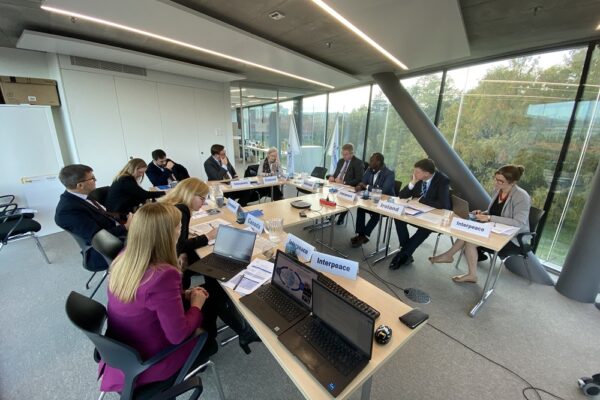
Interpeace is grateful to Ambassador Michael Gaffey and Ambassador Nathalie Olijslager for their valuable contributions during their tenure in Interpeace’s Advisory Council. Their experience and expertise provided the organization with key strategic advice and guidance on peacebuilding policy and practice.
Prior to becoming Ireland’s representative to the United Nations in Geneva, Ambassador Eamonn Mac Aodha served as Director for Relations with the European Parliament and inter-institutional affairs at the Irish Representation to the EU since 2017. He brings over three decades of experience in diplomacy and international affairs, having joined the Irish Foreign Service in 1990. In addition to his diplomatic work, he was Member of the Irish Press Council and Adjunct Professor at the National University of Ireland.
Ambassador Lars Tummers was appointed Deputy Ambassador of the Netherlands to the UN in Geneva in 2022. Previously, he served as Ambassador to Libya from 2018 until 2021 and as Special Envoy on Counterterrorism within the Dutch Ministry of Foreign Affairs. In addition, he has been Head of Political Affairs in Sudan, Senior Policy Adviser in the OSCE Mission to Kosovo, Political Adviser in the Kosovo Protection Force, Permanent Secretary for the UN in Kosovo and worked in the legal team of the UN Protection Force in Sarajevo.
The Advisory Council is a high-level, statutory body within Interpeace whose mandate is to provide the organization with strategic advice and guidance on peacebuilding policy and practice. It is composed of selected governmental and intergovernmental representatives, nominated because of the unique role these individuals are able to play in connecting peace and security policy and practice.
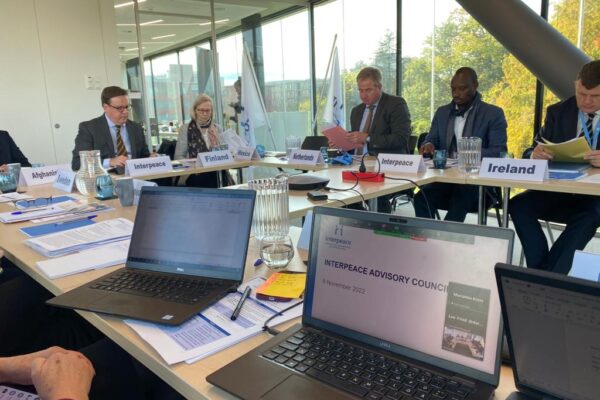
We are looking forward to working with Ambassador Mac Aodha and Ambassador Tummers as we seek to strengthen our positioning on key international policy agendas. Currently, Interpeace’s Advisory Council is composed by representatives of Afghanistan, Canada, Denmark, Finland, Ireland, Mexico, the Netherlands, Singapore, and Sweden.
Being young symbolizes great energy, positivity, and the zeal to make things happen. It also represents change, progress, and the future. If we lead our youth in the correct direction by providing platforms and establishing systems of learning and collaboration as well as amplifying grass-roots youth-led initiatives, they campion the fight against inequality, persecution, and climate change. Youth are our future gateway towards positively transforming our society. However, young people in the Great Lakes (GL) region, here understood as the four countries covered by the Interpeace regional programme —which consists of Burundi, the Democratic Republic of the Congo (DRC), Rwanda, and Uganda—, face obstacles when it comes to the availability of opportunities to channel their energy and enthusiasm to accomplish extraordinary things and influence decision-making in governance, peace and development processes at the local, national and regional levels.
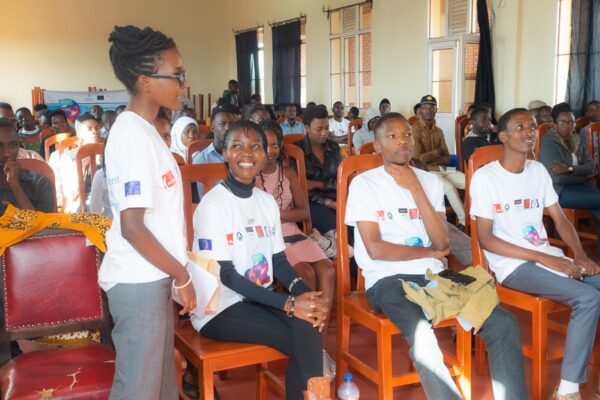
Past and persistent violence have had multifaceted effects on youth, who constitute the majority of the population of the GL nations. They face direct violence in some parts of the GL region, forced recruitment into armed groups, intergenerational trauma transmission, displacement, lack of access to quality education, and livelihood options. Some of the impacts and risks that disproportionately affect youth are exacerbated by cultural, ageist, and gender norms. Due to these obstacles, significant number of young men and women face barriers to civic engagement and involvement in political and peace processes.
In this context, Young Innovators from Burundi, supported by Interpeace and the Centre d'Alerte et Prévention des Conflits (CENAP), a consortium partner of the Youth Innovation Lab for Peace programme, funded by the European Union and the Swiss Development Cooperation (SDC), organized an event on intercultural exchange with young Burundian and Congolese academics, where youth reflected on the theme: "Respect for identity and cultural diversity, one of the pillars of peace." The activity sought to increase support for youth leadership in peacebuilding while empowering young people with skills and knowledge that enable them to effectively play a role in governance, peacebuilding, and development processes at the local, national, and regional levels. In close collaboration with young innovators from Ngozi University in Burundi, over 70 students from different cultural backgrounds, participated.
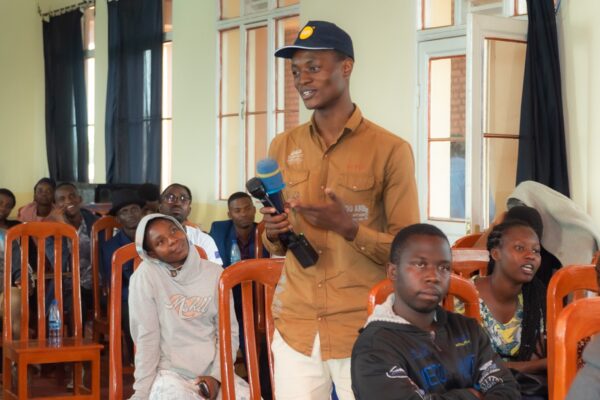
The rector of Ngozi University, while addressing the participants, remarked that peace has always been among humanity’s highest values, and it should be sort above knowledge. He urged the youth to take an interest in and commit themselves to building peace from an early age. "This event and the youth programming are relevant and should be supported because they promote youth involvement in peacebuilding, given the turbulent history Burundi and its neighbours in the GL area have endured," he said.
On their part, the students had a very lively and enriching exchange on the challenges and ways to promote respect for diversity. Young student musicians played thematic songs on peace, respect for diversity, and dialogue, which made the exchanges pleasant and informative. The event also brought out challenges to respect for diversity that young people experience. These include the traumatic wounds of the past conflicts; the negative influence of the elderly or relatives hurt by the past violence; the manipulation of young people by political leaders; a precarious socio-political environment conducive to conflicts; the promotion of private interests to the detriment of the public interest; poverty in general; and the precariousness of young people. Significantly, students also had the opportunity to learn lessons in respect for diversity shared by young innovators and other students.
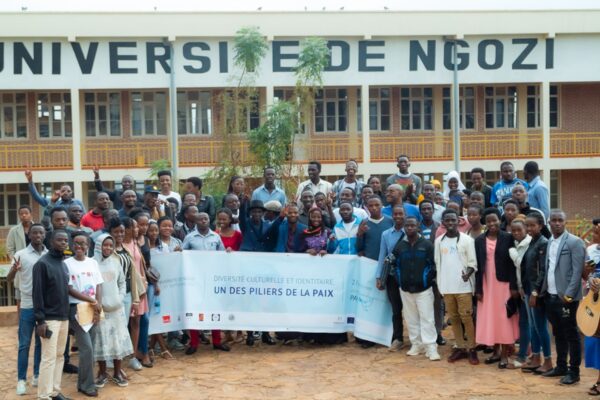
Through discussions for collective action and advocacy, Interpeace's primary goal is to empower the youth in the Great Lakes area to have a greater impact and leadership role in regional peace processes. We aim to provide spaces for young people to express themselves by producing and sharing messages of peace and for them to analyse challenges of respecting diversity in general and particularly in a student environment; and to share positive experiences in valuing diversity.
Côte d'Ivoire is not spared from external threats and the dynamics of regional and global conflict. These further destabilise the already fragile social fabric and endanger the government's achievements in security and economic development.
Over the last few decades, Côte d'Ivoire has itself been marked by socio-political crises and regular cycles of violence that have profoundly affected the lives of Ivorians, the way they live together and social cohesion.
Threats linked to armed groups at the country's doorstep call for the strengthening of the internal social fabric to prevent any risk of tipping over. It is usual for these groups to exploit the cracks and fissures caused by various factors to act.
In order to contribute to the efforts of Ivorian society, Interpeace, which has been present in the country since 2012, signed a partnership agreement with the Minister of Reconciliation and Social Cohesion on 21 October. This agreement aims to strengthen the consolidation of peace, reconciliation and national cohesion in the coastal country.
Both partners commit to work together in seeking and funding responsible and beneficial collaboration opportunities to achieve these objectives. Committed to close cooperation, the Ministry will provide political leadership, guidance and coordination of Interpeace projects, including the current Project to prevent political violence and strengthen social cohesion through dialogue and citizen collaboration in Côte d'Ivoire (PREDIA).
For its part, Interpeace will provide technical and methodological support to inclusive dialogue in all regions of the country, capitalising on lessons learned from conflict prevention mechanisms set up in cooperation with its local partner, Indigo Côte d'Ivoire, and targeting in particular women and youth. The organisation will also support local prevention and reconciliation committees and actively participate in the elaboration of strategies at the technical and political level adapted to Ivorian peacebuilding priorities, with a view to building sustainable peace and contributing to the strengthening of social cohesion.
"We are very pleased to engage in this partnership with the Ministry of Reconciliation and Social Cohesion," says Interpeace's West Africa programme representative Alessia Polidoro. "The methodological rigour of our approach, the diversified experience of successful interventions in different contexts around the world and the expertise of our team and our local partner, Indigo Côte d'Ivoire, will be pooled with the Ministry to provide concrete, endogenous and sustainable solutions to the various challenges to be addressed.
Read more about Interpeace in Côte d'Ivoire here.























